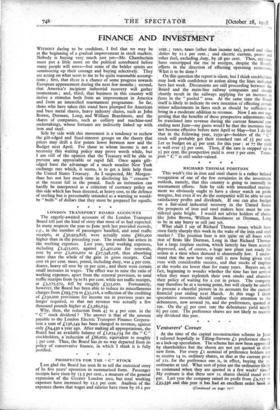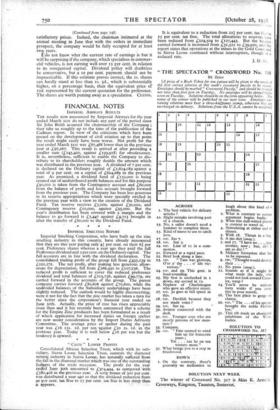FINANCE AND INVESTMENT
WrrHotrr daring to be confident, I feel that we may be at the beginning of a gradual improvement in stock markets. Nobody is buying very much just yet—Mr. Chamberlain must put a little more on the political scoreboard before many people will move—but some of the bolder spirits are summoning up their courage and buying selectively. They are acting on what seem to me to'be quite reasonable assump- tions ; first, that there is a chance of some progress towards European appeasement during the next few months ; second, that America's incipient industrial recovery will gather momentum ; and, third, that business in this country will derive a stimulus both frOm an improvement in America and from an intensified rearmament programme. So far, the who have taken this stand have plumped for American and base metal shares, heavy industry shares, such as John BrOwn, Dorman, Long, and William Beardmore, and the shares of companies, such as colliery and machine-tool undertakings, whose fortunes are indirectly linked up with iron and steel.
Side by side with this movement is a-tendency to eschew the gilt-edged and fixed-interest groups on the theory that prices may drift a few points lower between now and the Budget next April. For those to whom income is not a necessity this waiting policy may prove worth while, but I am still of the opinion that the Treasury will be able to prevent any appreciable or rapid fall. Once again gilt- edged have the advantage of a much steadier New York exchange rate which, it seems, is to get .a little help from the United States- Treasury. As I suspected, Mr. Morgen- thau has not lost much time in disclosing his " concern at the recent fall in the pound. Such an intimation can hardly be interpreted as a criticism of currency policy on this side which has been directed, at heavy cost, to the defence of sterling but is presumably intended as a warning to would- be " bulls" of dollars that they must be prepared for squalls.
LONDON TRANSPORT BOARD ACCOUNTS
The eagerly-awaited accounts of the London Transport Board tell just the kind of story that most of us had expected. In many respects the year to June 3oth last provided records, e.g., in the number of passengers handled, and total traffic receipts, at £30,923,828, were actually some £680,000 higher than in the preceding year. The trouble has arisen in the: working expenses. Last year, total working expenses, including £2,425,000, against £2,400,000 for renewals, rose by over £1,000,000 to £27,348,256, thus absorbing more than the whole of the gain in gross receipts. Coal cost 16 per cent. more, petrol, including duty, was 4 per cent dearer, heavy oil rose by to per cent., and there were certain small increases in wages. The effect was to raise the ratio of working expenses, apart from the renewal provision, to total traffic receipts from 79 to 81 per cent while net traffic receipts, at £3,575,572, fell by roughly £355,000. Fortunately, however, the Board has been, able to reduce its miscellaneous charges from £293,779 to £35,216, a reflection of the crediting of £230,000 provisions for income tax in previous years no longer required, so that net revenue was actually a few thousand pounds higher at £5,265,034.
Why, then, the reduction from 41 to 4 per cent. in the " C " stock dividend ? The answer is that of the amount paYable to the London Electric Transport Finance Corpora- tion a sum of £136,549 has been charged to revenue, against only £64,430 a year ago. After making all appropriations, the Board had an available balance of £1,054,154 for the " C " stockholders, a-reduction of £66,000, equivalent to roughly I per cent. Thus, the Board has ,in no way departed from its policy of conservative finance, in which I think it is fully justified.
* * * * PROSPECTS FOR THE C" STOCK
X am glad the Board has seen fit to tell the statistical story of `its five years' operation in summarised form. Passenger receipts have risen by 13.3 per cent, a measure of the general expansion of the Greater London area, but total working expenses have increased -by 15.5 per cent. AnalYsis of the expenses shows that wages and salaries have risen by 16.1 per cent. ; rates, taxes (other titan income tax), petrol and other dikes by 11.1 per cent. ; and electric current, petrol and other fuel, excluding _duty, by, 2/3 per cent. ' Thus, expenses have outstripped the rise in receipts, _despite the Board's • efforts in the direction . of effecting operating economies. 'What is to be done?
Onthis.question the report is silent, but I think stockholders may look with confidence to action along the lines indicated !here last week. Discussions are still proceeding between the ;Board" and 'the main-line railway' companies and should !shortly -result in the railways applying for 'an increase in !fares in the " pooled " area. At the same time the Board !itself is likely to indicate its own intention of effecting certain !minor adjustments in fares such as shOuld be sufficient to ;bring in a moderate addition-to tevenue.- Now I• am not sug- gesting that the benefits of these prospective adjustments will !be translated into revenue during the current financial year ending next June—my guess would be that the increases may not become effective before next April or May—but I do feel that in the following year, I939m0—holders of the " C " stock will probably get their standard rate of 54 per cent. , Let us budget on 44 per cent. for this year : at 77 the yield is well over A per cent, Then, if the rate is stepped up to '5i per cent. the prospective-yield is over 7 per cent. Trans- :port " C " is still under-valued.
* * * *
RICHARD THOMAS POSITION
• Thii week's rise in 'iron and .steel shares is, a rather belated recognition of one of the few certainties in the investment outlook, namely, that this country is going -to intensify its rearmament efforts. Side by side_ with intensified rearma- ment we obviously ought to have a closer watch on profit margins, but even if we do the aoinParrieTsbe able to' earn satisfactory profits and dividends. If one can :Aso budget on. a fair-sized industrial recovery in the United States the prospects of iron and steel makers here must be con- sidered quite bright. I would not-advise holders of shares :like John BroWn, William Beardmore, or Diifirian, Long to be in any -hurry to sell just yet. What shall I say of Richard Thomas issues -Which have risen fairly-sharply-this week in the wake of the iron and steel market ? The position here is not qtrite. on 'fours with that of firms like Dorman, Long in that Richard Thomas has a large _tinplate section, which latterly has heen acutely I depressed, arid, of course, a huge new plant just ready for action at a time when demand is abnormally low. I under- stand that the new -hot strip mill is now being 'given trial runs with considerable success, and that stocks of tinplate ! at the works are lower than for many years. Buyers are, in I fact, beginning to wonder whether the time has not arrived I when they must replenish their own stocks and abandon !their policy of waiting for a cut in prices. The company may therefore be at a turning point, but wiliclearly be unable. to present 'a cheerful picture in its accounts for the current financial. year ending next March.- At this stage I think speculative investors should- confine • their attention' to the . debentures, now around 70, and the preferences, quoted at los. On the 44 per cent. rate the debentures yield nearly 64 per cent. The preference shares are not likely to receive any dividend this year.
Venturers' Corner
At the time of the capital reconstruction scheme in June I referred -hopefully to Tilling-Stevens Lt preference shares as a lock-up speculation. The scheme has now been approved by shareholders but the shares are not yet quoted in their new form. For every Li nominal of preference holders are to receive 14 Is. ordinary shares, so that at the current price of HS. for the preference one is, in effect, buying the is. !ordinaries at rod. - What sort of price are the ordinaries likely to command when they are ;quoted in 4 few weeks' time ? My estimate is that these new Is. shares shonld stand over par. Last year the company raised its profit from £9,727 to £35336 and...this yeat Alias_ had an excellent order_ book at
(Continued on page 75,..i)
(Continued from page 748) satisfactory prices. Indeed, the chairman intimated At the annual meeting in June that with the orders ininunediate prospect, the company would be fully occupied for at- least twq, years. rdo not know what the current rate of earnings is but it will surprising if the company, which specialises in commer- cial vehicles, is not earning well over is per cent. in relation to its reorganised capital. Dividend policy will doubtless be conservative but a to per cent. payment , should not be impracticable. If this estimate proves correct, the is. shares can hardly stand at less than is. •3d. which is substantially higher, on a percentage basis, than ihe equivalent price of tod. represented by the current quotation for the preference. The shares are worth putting away as a speculation. CUSTOS.

























































 Previous page
Previous page